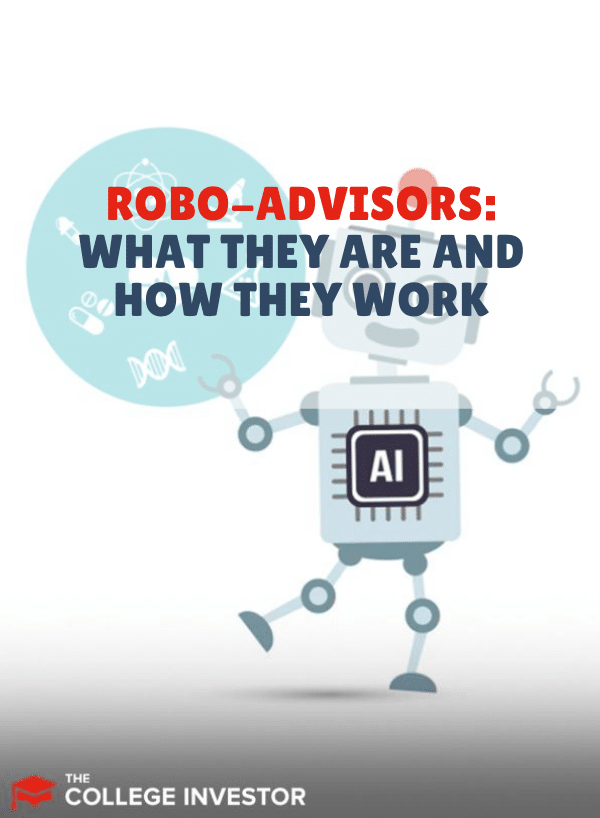
Automation has affected large swaths of the modern economy. And everyday investors can benefit from automation too. Robo-advisors are platforms that use algorithms to automate investments on behalf of clients.
These platforms make it easy for investors to “do the right things” automatically. And because the advice and actions that a robo-advisor takes on behalf of its clients is automated by computers, their fees are usually much lower than you'd pay to a human financial advisor.
Robo-advisors occupy a sort of middle-ground between 100% DIY and fully managed investing. But are they right for you? In this article, we explain how robo-advisors work, when they may make sense, and when to avoid them.
What Is A Robo-Advisor?
A robo-advisor is a common name for a platform that helps users invest into financial markets using some sort of algorithm. Although they have the word “advisor” in the name, most don’t offer human financial planning advice unless clients pay extra for it.
The overwhelming majority of robo-advisors follow a time-tested strategy called Modern Portfolio Theory. This strategy involves investing in low-cost, broad-based index funds (usually ETFs), with a representation of Domestic, International, Growth, Income, and Small Cap stocks.
However, some invest in individual stocks, active mutual funds, or follow strategies outside of traditional index fund investing. Wealthfront and Betterment are some of best-known names in robo-advising, but there are many more worth considering (especially little known names like M1 Finance).
Most robo-advisors offer some degree of customization (based on your age, risk tolerance, timeline to your goal, etc.), but will do all the investing on your behalf. When it comes to investing, you can put money into a robo-advisor platform and know that it is being invested with a goal towards sustainable growth and tax efficiency.
How Do Robo-Advisors Work?
The common thread among all robo-advisors is that the platforms operate programmatically. Computers invest your money using some predictable strategy. No human intervenes in the investing (unless you pull money out or put money in).
Most robo-advisors invest your money into ETFs or mutual funds. Whenever you deposit money to the platform, the platform will buy partial shares of your investments. Periodically, the robo-advisor will sell some of your best performing assets, to buy some of the lowest performing assets. This is called “rebalancing," and it is one of the top benefits of robo-advisors.
Robo-advisors also record all the trades that they do on investors behalf. This allows the investors to accurately account for gains and losses at tax time. It also allows investors to take advantage of tax-loss harvesting rules to lower their tax burden by offsetting their gains with their losses.
How Much Do Robo-Advisors Cost?
As robo-advisors become more common, the average price of using them is falling. In general, they use an Assets Under Management (AUM) model of pricing. That means the price you’ll pay is a percentage of your total money invested on the platform.
Prices tend to range from 0.25% to 0.75% of Assets Under Management per year. If you have $100,000 under management and your fee is 0.25%, you’ll pay $250 per year for the robo-advisor's services.
In addition to the management fee, you’ll have to pay fees on the underlying investments in the portfolio. The most popular providers use extremely low-cost ETFs or stocks to keep “internal costs” low for investors. However, the cost of investments is worth investigating if you’re considering a robo-advisor.
Do DIY Investors Need A Robo-Advisor?
Robo-advisors provide a useful service to a segment of investors. People who have the desire to invest but don’t want to worry about technical matters like learning how to buy funds or manage a portfolio may benefit from using one.
However, the benefits of tax efficiency are only important to borrowers with after-tax brokerage accounts. But, in general, the only investors who should consider opening a taxable account are those who have maxed out their retirement account options. And that's a fairly thin slice of the population.
Additionally, the benefits of a well-diversified portfolio can be achieved with two to five broad-based index funds. The basics of investing can be easy to learn. But if you don’t care to learn them, then a robo-advisor or human financial advisor is a must.
Times To Consider A Robo-Advisor
While robo-advisors aren’t for everyone, some investors may benefit from using one. These are the times to consider using a robo-advisor to invest.
You Don’t Care To Learn The Technical Aspects Of Investing
Learning to invest in financial markets isn't tough. But you will need to figure out where to open an account, what type of account to open, how to buy investments, and how to keep buying into the market. Over time, you will need to learn about things like Asset Allocation and portfolio management.
Many successful investors use simple strategies (similar to those employed by the Robo-Advisors) on their own. But if you’re someone who doesn’t want to learn about investing, you can offload the technical aspects of investing onto a robo-advisor.
You’re Seeking Tax Efficiency
If you’ve got a lot of money in a savings account, or in an after-tax brokerage account, using a robo-advisor could be a smart move for you.
Robo-advisors take advantage of tax-loss harvesting, which allows investors to sell investments for nominal losses, and thereby show losses in their portfolio. This allows the investor to offset the taxes they have to pay on gains.
Tax loss harvesting is technically challenging but very profitable for people with large amounts of money in non-retirement accounts. For this type of investor, using a robo-advisor can pay off.
You Want To Get Started With Limited Fuss
Robo-advisors can be a great way to dip your toes into the financial markets. The platforms are easy to use and they help beginner investors avoid some of big mistakes (such as trading too often, or being under-diversified).
If you have money you want to invest today, a robo-advisor can help you get started. They can help you move past analysis paralysis and get you moving in the right direction.
Times To Avoid A Robo-Advisor
Here are a few situations where using a robo-advisor may not be your best option.
You Want Somone To Motivate You To Stick With Your Plan
Robo-advisors aren’t humans. They aren’t going to “talk you off the ledge” when you want to sell low and buy high. They can't help you master some of the more difficult aspects of behavioral finance. Financial counselors and Certified Financial Planners (CFPs) are better equipped to help humans handle the emotional ups and downs of investing.
You Have A High Risk Tolerance
Most robo-advisors automatically invest some portion of investors money into bonds, cash or similar low volatility options. Most strategically invest a larger share of the money into those “safe havens” as investors get closer to their goal date (including retirement).
If you have a high risk tolerance, or you need higher returns to meet your goal, safe haven investing may not make sense for you. Be sure to investigate whether the standard allocation (and the change in allocation over time), makes sense given your appetite for risk.
You Want To Actively Invest Or Select Individual Stocks
Robo-Advisors are passive investment platforms. Those who want to invest in individual stocks or actively manage their portfolios according to certain rules aren’t good candidates for this type of investing. Robo-advisors help users stick to a prescribed path and that path doesn’t involve selecting individual stocks.
You’re Willing To Learn The Technical Aspects Of Investing
As previously mentioned, most people can easily learn the basics of investing by reading a single book, taking a short course, or by reading a few articles every day.
Learning the technical basics of investing can keep you from being hoodwinked by nefarious actors and can keep you from freaking out when you see losses in your portfolio. If you’re willing to that, and you have the time, you can probably skip the robo-advisors.
Your Only Accounts Are Employer-Sponsored Accounts
A lot of people start investing through employer-sponsored retirement accounts like 401k accounts or 403b accounts. If you have one of these accounts, you’re stuck with your employer’s chosen provider and don’t need to worry about robo-advisors unless you choose to leave your company (and want to rollover the account).
Most Popular Robo-Advisors
Now that you understand the basics of robo-advisors, here are the most popular ones:

Betterment
Betterment is one of the largest robo-advisors out there, and it's become more popular with additional offerings such as banking and access to CFPs. They currently charge 0.25% AUM to start, which is one of the lowest fees you'll find in the space. If you're considering a robo-advisor, this should be a top contender for you. Check out Betterment here >>

Wealthfront
Wealthfront is incredibly similar to Betterment, and as such, also has a lot of popularity. They help with financial planning via their software, and they have also created banking products to rival Betterment. They do charge slightly more, at 0.25% AUM. Check out Wealthfront here >>
Final Thoughts
For a modest cost, a robo-advisor can push you towards a tax-efficient, well-diversified portfolio of stocks, bonds and other financial instruments. Of course, with some work, you can also build that with DIY investing. But you need to be honest with yourself about whether you’ll actually do that.
I like robo-advisors for people that have struggled to get started with investing. The platforms make it easy to automate great behavior such as investing regularly, rebalancing, and sticking with your asset allocation.
But if you'd like to be more hands-on with your investing decisions, a discount stock broker will be a better choice. These are our favorite stock brokers.

Robert Farrington is America’s Millennial Money Expert® and America’s Student Loan Debt Expert™, and the founder of The College Investor, a personal finance site dedicated to helping millennials escape student loan debt to start investing and building wealth for the future. You can learn more about him on the About Page or on his personal site RobertFarrington.com.
He regularly writes about investing, student loan debt, and general personal finance topics geared toward anyone wanting to earn more, get out of debt, and start building wealth for the future.
He has been quoted in major publications, including the New York Times, Wall Street Journal, Washington Post, ABC, NBC, Today, and more. He is also a regular contributor to Forbes.
Editor: Clint Proctor
